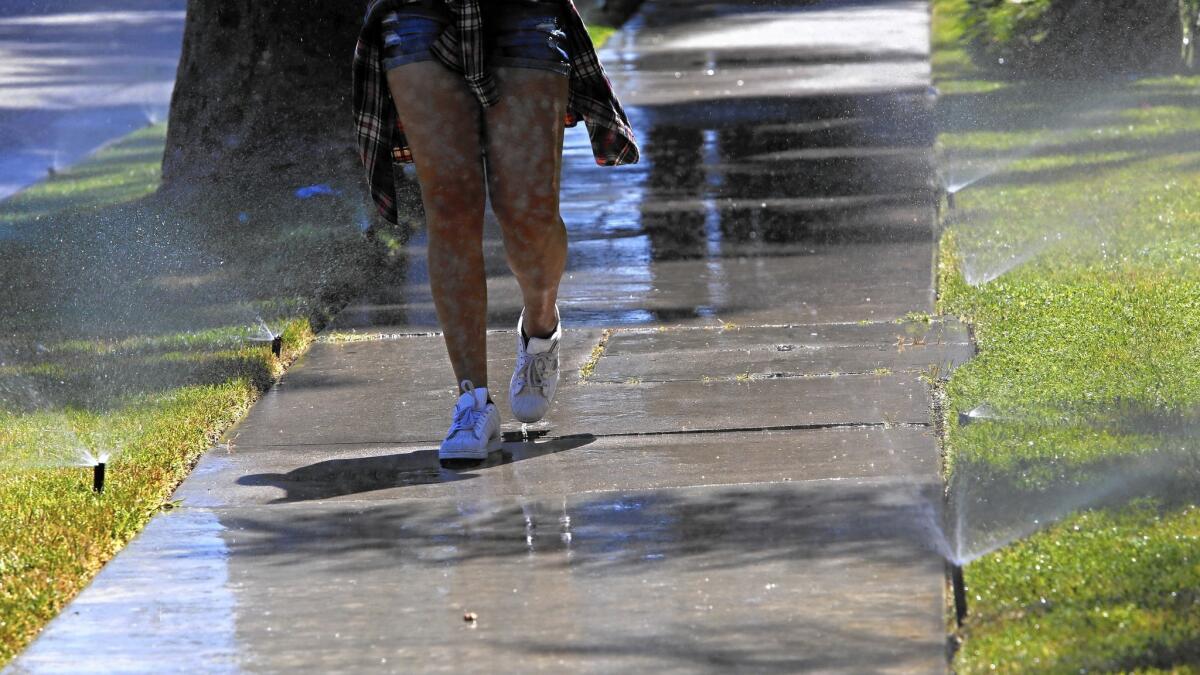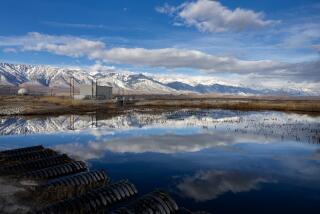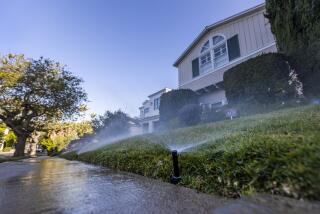Another DWP bill? No: ‘You are in the top 1% of all residential water users’

Warren Dern thought he was doing his part to conserve water amid California’s unflagging drought. He was following the city’s rules and only watering his 7,000-square-foot lawn in Sherman Oaks twice per week.
Then, last month, he got a letter from the Los Angeles Department of Water and Power, and it dawned on him: That simply wasn’t enough.
“LADWP records show that you are in the top 1% of all residential water users,” the letter said. “I ask that you carefully look at your water habits and take steps to reduce your water consumption.”
City water officials are getting personal with their efforts to boost conservation. Last month, DWP began sending letters to the 1% of residential water users, like Dern, who use the most water. The letters urging homeowners to improve their water-wasting habits went to about 4,600 homes, largely in upscale neighborhoods with big lots and lush lawns.
As the letters have flowed out, calls have flooded into the department from homeowners, some upset, some chagrined by the city’s latest attempt to slash water use as California suffers through a fourth year of drought.
“It was a wake-up call,” Dern said. “I was like, ‘Wow, maybe we’re part of the problem.’”
The letters are arriving as DWP and more than 400 urban water districts statewide face mandatory water use cuts ordered by Gov. Jerry Brown. DWP must slash its water consumption by 16% by February 2016 or face fines of up to $10,000 per day from the state.
Making the cut will be made easier, city water officials say, if the largest users tighten their water belts.
A day after receiving his letter, Dern called DWP and asked how he could conserve more. Now, the 51-year-old lawyer is installing water-efficient sprinkler heads, replacing about 5,000 square feet of grass with artificial turf, and pouring cement where plants used to thrive.
Experts and conservationists say targeting the top water consumers is a smart idea that was overdue. Max Gomberg, a senior scientist for the State Water Resources Control Board, said he was not aware of any other water agency sending out letters like DWP’s.
“I’m glad they are stepping it up,” said Conner Everts, facilitator of the Environmental Water Caucus, an organization that promotes sustainable water management. “We’re going to have to do all this and more.”
The department started sending the letters out in mid-May. Officials used meter readings between May 2014 and April 2015 to determine customers’ average daily water use, department spokeswoman Michelle Figueroa said.
The largest share of letters went to homes in affluent pockets of the Westside and the sprawling hot neighborhoods of the San Fernando Valley, according to DWP records.
More than 600 letters went to Brentwood, the ZIP Code that received the most. Collectively, 42% of the city’s highest residential water users live in Brentwood, Bel-Air, Beverly Crest and Pacific Palisades, according to department data.
More than 500 of L.A.’s heaviest users live in Encino, and hundreds more are in neighborhoods such as Tarzana, Woodland Hills, Chatsworth and Studio City.
At least 100 customers like Dern called or wrote to the department after receiving a letter, said Julie Spacht, DWP’s water executive managing engineer.
“We’ve hit a nerve,” she said. “It’s one that shows the public consciousness has risen to a higher level than I believe it ever has been before.”
Excessive water use isn’t associated with specific “property characteristics,” Figueroa said. But officials said that customers who called often blamed high water usage on large lots, leaks, big families and water-intensive fruit trees.
It will take up to a year for the department to determine whether the letters were effective, Spacht said, in part because some water-saving changes take time to accomplish. Dern said it will take a few months to install new landscaping at his home. He’s hoping to cut his outdoor water use 75% by the fall.
The move is at least the second such tactic LADWP has employed this year to drive down residential water use. Officials said they also launched a pilot program in January that sent reports to 20,000 randomly selected customers explaining how their water use compares to others in the city.
The yearlong “pilot study” uses WaterSmart software, officials said, to show customers how much water they use compared to “average” and “efficient” households similar to their own.
For much of the last year, DWP officials have stressed education and outreach rather than fines for water waste. In April, the department assessed only eight penalties despite issuing more than 1,400 warnings, according to the most recent state data available.
DWP officials have said they issued few fines because most Angelenos change their behavior after a warning. The letters, they say, are another tool to encourage customers to change their habits.
“You’re not just tapping into altruism, you’re tapping into social norms,” said Jonathan Parfrey, a former DWP commissioner who is now executive director of Climate Resolve, a nonprofit that focuses on how L.A. can adapt to climate change. “People want to be in line with or more virtuous than their neighbors.”
Twitter: @ByMattStevens
More to Read
Sign up for Essential California
The most important California stories and recommendations in your inbox every morning.
You may occasionally receive promotional content from the Los Angeles Times.











